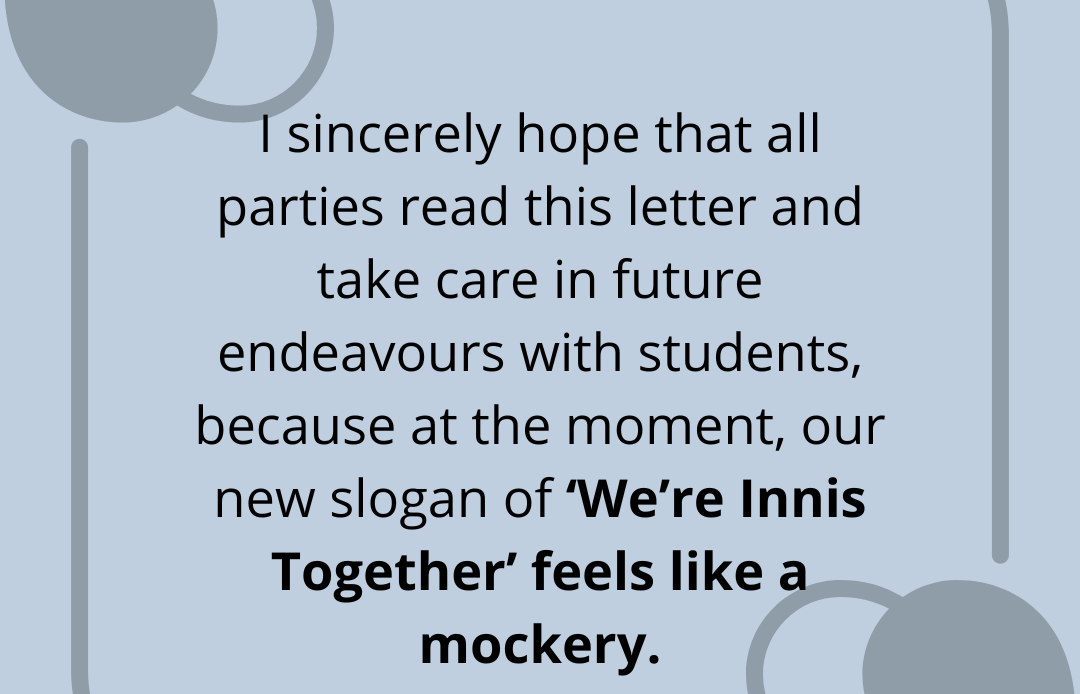Neglect: An open letter to the Innis College Residence and the University of Toronto

The idea of winter break is to celebrate one’s accomplishments throughout the previous semester and allow time to unwind. However, for some living on campus, doing so proves to be difficult because of the clear profit motive and anti-resident stance, intentional or not, by the Innis College Residence and the University of Toronto as a whole.
In mid-November, I was reminded of the building’s closure over the winter break. I knew of this beforehand, but what was surprising was the fact that nothing was going to be done for residents who do not have family or friends to stay with. This is in stark contrast to the year prior, when the university provided stays at CampusOne, the high-end student residence at the southern end of campus, for $300 total. This year, the Innis Residence’s ‘solution’ was to link a page suggesting hotels that cost $150-300 a night to stay at. This was up to 20 times the price of what was offered last year, 3 to 6 times the existing nightly rate of the residence building, and a third of the annual residence’s fees. This apathetic stance to providing support tells the resident body that the building is more than happy to leave you to fend for yourself in times of crisis. The most vulnerable of residents were suddenly forced to spend thousands of dollars on alternative accommodations.
Upon immediately emailing the residence with my concerns that I could not afford what was suggested, I was told that that was the policy, and to familiarise myself with the occupancy agreement (despite me not contesting the policy at any point). My concerns were completely disregarded. After further correspondence, I was told to look into CampusOne availability (they were not accepting any winter break stays), Airbnb listings, and short-term rentals (in the highly inflated rental market, many of which required months-long leases). In the end, there was nothing that they were going to do.
On December 21st at 5:00 PM, I was homeless. I could not afford any of their suggestions. Their initial email said I could email the residence to get support if I had nowhere to stay, and that is what I did. Ultimately, this left me with false hope and took up enough of my time to the point where it was too late to seek emergency funding from the registrar (which tried their absolute hardest to help me otherwise).
I originally planned to spend my mornings sleeping at Robarts Library, which opened at 9:00 AM. It is quiet enough during weekends and periods of online learning that I could find a place on a higher floor to sleep. My afternoons and evenings would be dedicated to sleeping, getting food, hanging out at the library, trying to find something to do, and using the washroom. My overnights would then be spent at a twenty-four-hour gym or at a fast-food establishment.
However, at the last possible minute, Robarts announced it would instead be closed over winter break. The province then announced another shutdown: due to the rise of the Omicron variant, restaurants were closed for in-person dining after 11:00 PM and gyms were also closed. Both completely upended my plans for some sort of shelter; a plan that I had focused on in lieu of studying for final exams and assignments.
So instead, I slept on the subway, coming into close contact with thousands of commuters over the couple hours I could manage to sleep. I distinctly remember waking up to a packed train during the peak of Omicron. Overnight, I took night buses for any sort of warmth under the below-freezing December temperatures. I had a handful of scary moments with substance-users and those with precarious housing situations also seeking shelter. I am sure it was not the intention of residence staff to put me through this, but their inaction and inability to offer quality assistance allowed for a precarious situation to go from bad to worse and could have been life threatening.

Over the course of three days, I got about five hours of sleep – all on the subway. I started hallucinating, my back was destroyed from always carrying around a backpack, I developed constipation, my laptop was damaged from all the movement, and my mental health was even worse than what it was previously. I could not handle it anymore and I broke down crying on the floor of St. George subway station. As a last-ditch attempt for somewhere to sleep for the night, I called Campus Police asking if they had any beds. It took some convincing that I was in danger, but they eventually arranged for me a place to stay at the Chestnut Residence for free. I honestly and truly cannot thank them and Chestnut enough for their kindness, compassion, and willingness to help. They saved my life.
My story should not have happened. It is frustrating that anyone from the university would allow it to. I had reached out for help a month prior; I hope this is not the case, but it did not seem like anyone cared. I also informed the Innis Residence Council prior to winter break, who promised to bring it up at a residence forum meeting, but if anything came of it, I did not see it. I was told on more than one occasion to talk to my dons about my situation, but to unload my problems onto someone my own age with no position of authority and their own issues to deal with is completely irresponsible. Ultimately, I do not know how I am just expected to move on and act like this never happened; the stress prior and after has made it impossible for me to work on assignments and study for finals, and the chance of failure in my current classes are high. I suggest three things which desperately need to change at all levels.
Firstly, focus on kind, compassionate messaging. It is disheartening to share personal financial details with someone, only to be met with cookie-cutter responses. My trust in the institutions that are meant to help students are gone and now the likelihood of me emailing for help, even for the most banal of problems, is almost zero. When students message you with serious problems, treat them seriously. Students are expected to deal with so much and mentally withstand even more. When most are wondering where their next meal is coming from or where they are going to live after residence, the least that can be done is a swift and thoughtful solution to the problems they bring forward.
Secondly, constant communication between departments. It is okay to admit that you cannot solve a problem. It is not okay to string someone along with potential solutions that do not fit the circumstance. If at any point during my correspondence, the residence had admitted that they were likely not going to be able to solve my issue and reached out to someone who could, then this article might not have been written. Specifically, the registrar and the residence should not be as separated as they are; when I emailed the registrar after the residence could not solve my problem, they wished that they had known sooner so they could have provided something ahead of time. Previously, when awaiting funds from a grant for summer residence fees, I had to inform the residence of such as there would be a delay in payment. Interaction between the two would greatly improve the experiences of Innis students in getting help and would increase the number of students asking for assistance, since continuously passing the buck, as is happening now, demotivates and frustrates to the point of giving up.
Thirdly, a streamlined process for applying for alternative accommodation over winter break. To avoid a repeat of what occurred to me, it would be much easier to create a form that a resident can fill out if they do not have anyone to stay with over the holidays; help residents follow the policy you pride yourself on. This would ideally inform both the residence and registrar, and would also remove the dehumanising act of unloading everything wrong with your life in order to get funding. Professors have started acknowledging this very problem with regards to late extensions; it is not uncommon to see a simple form for registering assignment extensions.
Concluding, it is important that policy and official stance is enforced in a compassionate way for students. You can kick people out for two weeks, but help students manage this restriction. Without support, something terrible is bound to happen to the students who failed to receive it. It is a very dangerous game that our administration is playing. What if someone in a financial situation like me had a bedbug infestation? Would they be homeless while their room was fumigated? Would they fail to report it, to prevent that situation? I sincerely hope that all parties read this letter and take care in future endeavours with students, because at the moment, our new slogan of ‘We’re Innis Together’ feels like a mockery.
Protect your students.

I have no idea why this article turned up in my newsfeed, but as someone who stayed at Innis between 1996 – 1998 I am both horrified and deeply saddened to learn this is how Innis is currently treating students. Yes, Innis closed for two weeks back in the late 90s. As someone who came from an abusive home environment, I am so grateful an exception was made for me those years by the clearly kinder and more civilized folks running the residence. Although the residence was closed, I lived there by myself with maybe one or two other students I never really saw for that two week period. There was no big deal in that then, and I absolutely can not see why it couldn’t have happened now. Innis forcing a student into dangerous circumstances is absolutely disgusting. The university as a whole should be ashamed and owes this student compensation for harm caused.
To the writer, my house is always open for you!!
Have you tried renting in lieu of overpriced student dorms?
You may have to learn to take care of yourself, but housing isn’t really a school’s responsibility.
Actually, housing IS a school’s responsibility — especially when they offer it — as universities have offered for over a century. When I entered university in the late 90s, I was leaving an abusive home environment. I was barely 19 and arrived from a small town alone and without resources. I was only vaguely familiar with Toronto. I had no idea where to rent, or with / from whom. I had no furniture. I needed a safe environment from which to become oriented while my whole life changed. I started renting after I’d accumulated the resources to do so. But, as is evidenced by your callous, condescending comment, you don’t care about these sort of details. TBH, its deeply distrubing that someone could read what happened to this student and blame them.
BTW: Students living Innis *do* take care of themselves — they have shared kitchens with no meal plan and are responsible to maintaining the cleanliness of their own apartments within the residence. They do their own grocery shopping and laundry, too. Innis residence is essentially an on-campus rental. The two week closure between semesters is hardly required since there is front desk/security staff on-site the whole time, anyway. So, in addition to being callous, your comment demonstrates you don’t really know what you’re talking about and are merely being cruel for sport.
Have you ever tried not being an asshole?
Universities might not be responsible for student’s housing, but they have all the responsibility to help and support their students by at least searching for realistic solutions to problem solve with them. Just giving a standard answer without looking at the individual’s situation is irresponsible. Slamong the door on them is shameless. This is not the first time I heard or witnessed stories how disconnected UT is with their students and how bureaucratic the school is. It appears to me that all they care is getting to the top of the best schools by focusing on the academic achievements, the “person” has gotten lost behind the “marks”
Unbelievable! Shame on the university! What a lack of organization and compassion!
What a horrific experience I am so sorry you had to go through this. Absolutely terrible that UoT doesn’t understand not everybody enjoys the same level of financial stability and privilege. See if you can talk to a lawyer.
i’m pretty sure that putting you through such a situation with the additional fact that you’re a student, don’t have a source of income, and can’t possibly survive in such a situation for the entirety of the winter break in a freezing city such as toronto, because good god what the fuck